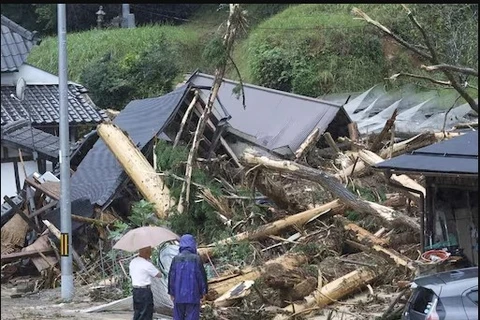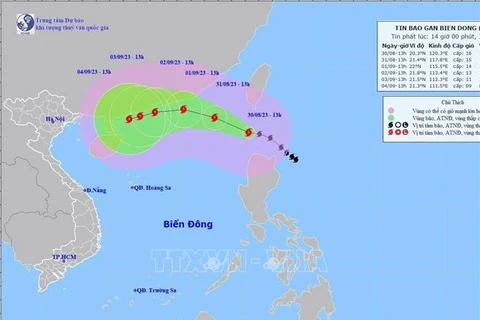Hanoi (VNA) - The strongest wind near the eye of Typhoon Saola reaches 184-201km per hour, as the storm is moving deeper into the northeastern waters north of the East Sea, causing rough seas.
Entering the waters on August 30, it is the third storm hitting the area this year. According to the National Centre for Hydro-Meteorology Forecasting, at 4am on August 31, Saola’s eye was at 21 degrees north latitude and 118.5 degrees east longitude, about 510 kilometers southeast of Hong Kong (China). The typhoon is moving west-northwest at a speed of about 10-15km per hour.
It is predicted to continue moving in the same direction on September 1 at 10-15km per hour, then west on September 2 and west-southwest on September 3 at 10km per hour. At 4am on September 3, its eye will be at 21.3 degrees north latitude and 112.1 degrees east longitude on the southwest waters of Guangdong (China).
The typhoon is forecast to maintain the west-southwest direction with a speed of 5-10km per hour in the following 72 to 120 hours. Its intensity is likely to gradually decrease.
The centre said from August 31 to September 1, the southern Central Highlands and south-eastern regions will experience moderate to heavy rains and scattered thunderstorms, with rainfall expected to range from 50-100mm to more than 150mm. The northern Central Highlands and south-western regions will see showers and thunderstorms, with rainfall of 20-50mm, and even over 90mm in some areas.
On August 31, the central and southern parts of the central region will experience scattered showers and thunderstorms, with a rainfall of 10-30mm and over 70mm in some areas.
People are recommended to watch out for the risk of flash floods and landslides in mountainous areas and inundation in low-lying ones. Heavy rains in a short period of time can cause flooding in urban areas, with a possibility of tornadoes, lightning, hail and strong winds during thunderstorms./.
Entering the waters on August 30, it is the third storm hitting the area this year. According to the National Centre for Hydro-Meteorology Forecasting, at 4am on August 31, Saola’s eye was at 21 degrees north latitude and 118.5 degrees east longitude, about 510 kilometers southeast of Hong Kong (China). The typhoon is moving west-northwest at a speed of about 10-15km per hour.
It is predicted to continue moving in the same direction on September 1 at 10-15km per hour, then west on September 2 and west-southwest on September 3 at 10km per hour. At 4am on September 3, its eye will be at 21.3 degrees north latitude and 112.1 degrees east longitude on the southwest waters of Guangdong (China).
The typhoon is forecast to maintain the west-southwest direction with a speed of 5-10km per hour in the following 72 to 120 hours. Its intensity is likely to gradually decrease.
The centre said from August 31 to September 1, the southern Central Highlands and south-eastern regions will experience moderate to heavy rains and scattered thunderstorms, with rainfall expected to range from 50-100mm to more than 150mm. The northern Central Highlands and south-western regions will see showers and thunderstorms, with rainfall of 20-50mm, and even over 90mm in some areas.
On August 31, the central and southern parts of the central region will experience scattered showers and thunderstorms, with a rainfall of 10-30mm and over 70mm in some areas.
People are recommended to watch out for the risk of flash floods and landslides in mountainous areas and inundation in low-lying ones. Heavy rains in a short period of time can cause flooding in urban areas, with a possibility of tornadoes, lightning, hail and strong winds during thunderstorms./.
VNA























